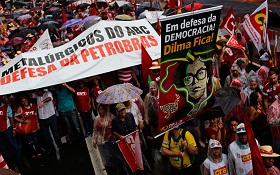Over the past few days media everywhere have been buzzing up reports that the often reticent Swiss justice ministry is investigating Odebrecht, Brazil's most prestigious and influential parastatal company, in connection with a massive corruption and money laundering scandal involving Brazil's state controlled oil giant Petrobras, known as Lava Jato (Car Wash).
Over the past few days media everywhere have been buzzing up reports that the often reticent Swiss justice ministry is investigating Odebrecht, Brazil's most prestigious and influential parastatal company, in connection with a massive corruption and money laundering scandal involving Brazil's state controlled oil giant Petrobras, known as Lava Jato (Car Wash).
A spokesperson for the Swiss justice ministry told media that Switzerland, as a financial center, has been seriously affected by the scandal. Brazil is cooperating with Swiss authorities on this matter as well as on the Fifagate probe.
Meanwhile in the United States the Federal Bureau of Investigation is continuing its investigation on corruption at Petrobras because the company sells shares on the New York Stock Exchange.
Odebrecht and “os seis campeões” (six champions)
Odebrecht is the largest parastatal company to which some in Brazil refer as one of “the six champions” who dominate public and private infrastructure projects in spoils system that hasn't changed much since the days of the Novo Estado and president Getulio Vargas.
These firms have close working relationships with the Brazilian State Development Bank (BNDES), which fund or guarantee their projects. Coincidentally, the interlocking relationships between the BNDES and the “six champions” are not much different that the “kairetsu” system one finds in Japan, where corruption scandals cause the downfall or disgrace of a government every few years.
President Rousseff recently gave an interview to a Mexico City newspaper indicating that she views the state owned BNDES as the driver of Brazil's economy. Two of the other “champions” Camargo Correia, and Andrade Gutierrez, are also embroiled in the Lava Jato scandal. These companies, like Bechtel in the United States, Bouyges in France and Hochtief in Germany, wield considerable political influence.
Marcelo Odebrecht, the 44 year old chairman of the global conglomerate that bears his family name, was placed in preventative custody on June 19th by Federal Police and is expected to be formally charged in a few days. Because of his considerable political influence, evidence that Odebrecht tried to hide his company's involvement in the Petrobras affair is being reviewed by the federal Supreme Court and being passed back to a lower court judge who is assigned to the matter.
Even former president Luiz Inácio Lula da Silva came to the defense of Odebrecht, suggesting that preventive custody for the leader of Brazil's leading parastatal company was extreme. Political opponents of Lula, who has already announced himself as a candidate for the presidency in the 2018 national elections, have accused him of steering business to Odebrecht in Haiti and in West Africa, during and after his presidency. He may face an embarrassing parliamentary inquiry when congress returns from its recess in late August.
Dilma's dealings with Odebrecht date back three decades to the time when she was involved with managing energy programs in the government of Rio Grande do Sul state at the beginning of her political career.
Social media could help Dilma avoid impeachment
With her approval rating slipping to 7% and 84% of those surveyed disapproving of how she is managing the economy, the best social media strategy Dilma's advisers can employ is to continue providing transparency to the political body and fend off her critics, particularly those who are calling for her impeachment.
Although polls indicate that 64% of those sampled think Dilma should be impeached for her alleged role in Lava Jato, only 35% of those sampled by the IBGE (Brazilian Institute for Statistics and Geography) organization are familiar with how impeachment works.
In a recent interview justice minister Jose Eduardo Cardoso said that impeachment proponents are “light years away” from presenting a proposal that would pass legal muster that could be presented to the Congress for consideration.
Another factor that could make impeachment a “red herring” issue is that both the president of the senate, Renan Calheiros, and the lower house Eduardo Cunha, are under investigation for their alleged roles in the Lava Jato scandal.
Prognosis
With Dilma facing pressure from a congress she doesn't control, her economic team has just backed off from the tough budget cuts it believed could provide her government with a modicum of fiscal stability, and credibility.
While media and opponents rant about the scandals it's helpful to note that Brazil has ample financial reserves to ride out the storm. In addition, as a nation, Brazil is the third largest holder of U.S. Treasury instruments after China and Japan, holding $256 billion.
In tight money situation and still hoping to rein in inflation Brazil is likely to experience more recession, more unemployment and increased social unrest for the next three or five years. This will make the economy the key issue in the 2018 presidential campaign.
The Lava Jato and Petrobras scandals did not create Brazil's economic crisis. The historic avarice of the nation's political class did. And it's just a matter of time until it happens again.
Note: Another scandal that is not being widely reported is the Federal Police investigation called “Operation Zealots” involving companies who allegedly bribed officials in the finance ministry so that they could pay fewer taxes and avoids fines.
As reported in Brazilian daily Folha and elsewhere, Federal Police says that the losses to government coffers could run as high as $5.8 billion.






